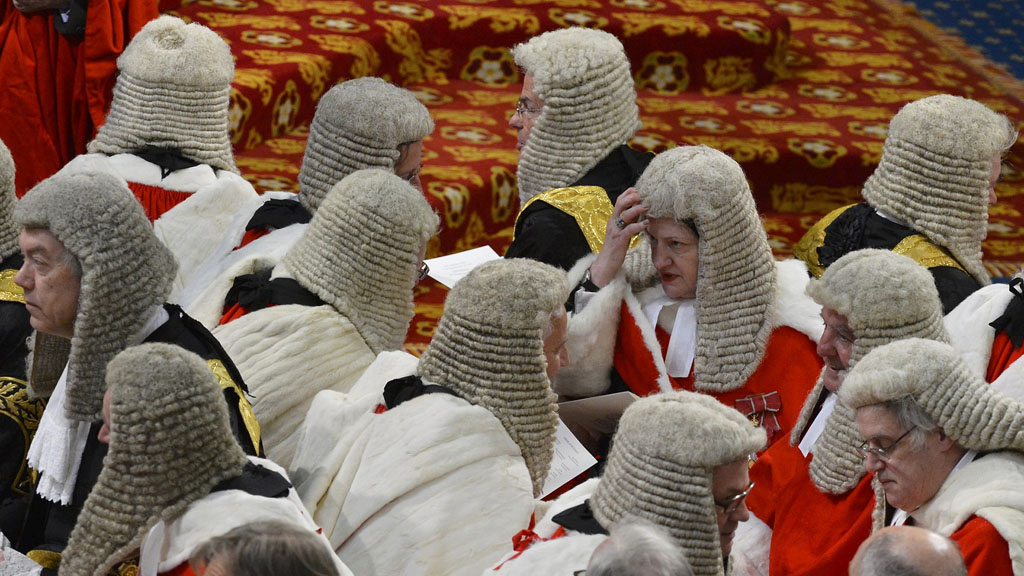Focus on immigration in Queen’s speech
The government lays out proposals for tighter controls on immigration in the Queen’s speech. But critics will focus on what has been left out of the coalition’s plans.
Announcing the coalition’s legislative programme for the coming year, the Queen said the immigration bill will aim to “ensure that this country attracts people who will contribute and deter those who will not”.
The bill will introduce tighter controls over migrants’ access to the NHS and ensure that temporary visitors to this country make a contribution to the cost of healthcare.
It will prevent illegal immigrants from getting driving licences, increase fines for businesses using illegal workers and require private landlords to check the immigration status of their tenants.
The bill will make it easier to remove people from the UK, limiting the right to appeal against deportation and specifying that all foreign nationals convicted of serious crimes will be removed except in “extraordinary circumstances”.
The Queen’s speech was written before the UK Independence Party’s surge at the expense of Conservatives in last week’s council elections, but the focus on immigration will be seen as an attempt by the Tories to counter the threat from the party.
Veteran Labour MP Dennis Skinner continued a Parliamentary tradition by making a quip during the ceremony.
As Black Rod, Lieutenant General David Leakey, informed MPs in the House of Commons that the Queen requested their attendance in the House of Lords, Mr Skinner said: “Royal Mail for sale, Queen’s head privatised.”
Growth agenda
Addressing MPs and peers in the House of Lords, the Queen said the government’s “first priority” was to restore Britain’s economic health, and the contained a number of measures designed to cut the regulatory burden on businesses.
A £2,000 annual employment allowance will reduce national insurance bills for companies. Up to 1.25 million employers will benefit, with around 450,000, or a third of all UK employers, taken out of paying employer NICs altogether.
And the deregulation bill will aim to cut red tape on businesses by repealing legislation that is no longer useful and placing a duty on regulators to have regard to the impact of their actions on growth.
Self-employed people whose work activities pose no potential risk of harm to others will be exempt from health and safety law.
More legislation will put in place to prepare for the construction of the high-speed rail link between London, Birmingham and the North of England, signalling the government’s determination to push ahead with the HS2 rail project despite opposition from Tory backbenchers.

Social care costs cap
The care bill will fix a £72,000 cap on the amount people in England have to pay for social care, in order to stop pensioners having to sell their homes to pay for care in their final years.
For the first time, millions of people caring for elderly and disabled relatives in England will be given the right to receive support from local councils.
In the aftermath of the Mid-Staffordshire health scandal, the bill will introduce Ofsted-style ratings for care homes and hospitals, and give the new chief inspector of hospitals more regulatory powers.
A pensions bill will introduce a single-tier pension worth £144 a week or £7,000 a year at today’s prices, and will raise the retirement age rises to 67 in 2026.
Other legislation announced today includes a move to tackle irresponsible dog ownership and to make it easier for victims of asbestos-related cancer to claim compensation.
What is missing?
Plans to introduce plain packaging for cigarettes and a minimum unit price for alcohol will not get parliamentary time in the coming year, but the health secretary, Jeremy Hunt, has said that no decision has been made to kill off the proposals altogether.
Once again, the promise to enshrine in law the pledge to pledge to spend 0.7 per cent of GDP on overseas aid has once more failed to reach the legislative agenda.
And Home Secretary Theresa May’s plan to give the police and security services access to records of individuals’ internet and email use has been ditched, after being branded a “snoopers’ charter” and getting blocked by Deputy Prime Minister Nick Clegg.
In an introduction to the speech, Prime Minister David Cameron and Mr Clegg said their plans were “all about backing people who work hard and want to get on in life”.
They added: “In May 2010, we came together to govern in the national interest. We knew the road ahead would be tough and so it has proved to be.
“But three years on, our resolve to turn our country around has never been stronger. We know that Britain can be great again because we’ve got the people to do it. Today’s Queen’s Speech shows that we will back them every step of the way.”
Unite’s general secretary Len McCluskey said: “The Queen’s Speech is more about trying to head off Ukip and quell a backbench revolt than deliver a legislative programme to get Britain back on track.
“David Cameron’s true intentions will be revealed in the Comprehensive Spending Review in June which is likely to continue this Government’s austerity addiction.”
Sir Andrew Green, the founder and chair of campaign group Migration Watch, said: “The government will have strong public support in making it a good deal more difficult to stay on illegally in Britain.
“However, implementation will be very difficult, so much more money will be needed for enforcement.”